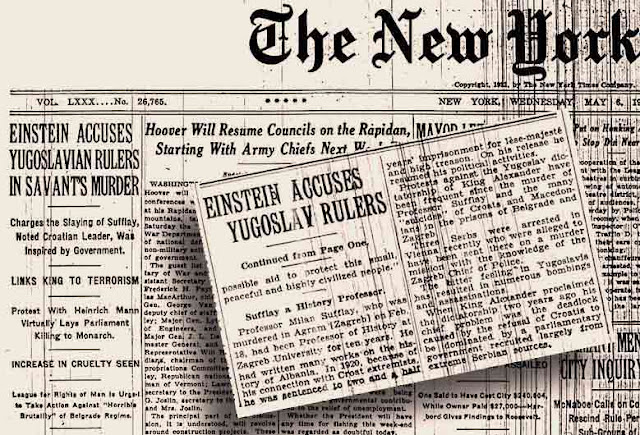CAUSES OF GENOCIDE AT JASENOVAC
Albert Einstein Protested Serbian Terrorism Over Minorities in Yugoslavia
One of causes of Genocide at Jasenovac:

Serbian terror over Croatian people preceded genocide that occurred at Jasenovac in World War II. After causing World War I and deaths of millions of innocent people (remember: Serbian terrorist Gavrilo Princip assassinated Archduke Franz Ferdinand of Austria and his wife, Sophie, Duchess of Hohenberg, in Sarajevo on 28 June 1914), Serbs continued terrorizing Croatian people and other minorities (Bosniaks, Albanians, Macedonians) up until World War II. In his 6 May 1931 letter, Prof. Albert Einstein (German Jew) protested Serbian terror in Yugoslavia.
Einstein Accuses Yugoslavian Rulers in Savant’s Murder
Charges the Slaying of Sufflay, Noted Croatian Leader, Was inspired by Government
LINKS KING TO TERRORISM
Protest with Heinrich Mann Virtually Lays Parliament Killing to Monarch.
INCREASE IN CRUELTY SEEN
League for Rights of Man is Urged to Take Action Against “Horrible Brutality” of Belgrade Regime.
Special Cable to THE NEW YORK TIMES
Berlin, May 5. – Accusing Yugoslav Government of the murder of a Croatian, Professor Milan Sufflay, who was struck down in the streets of Agram [Zagreb] on Feb. 18, Professor Albert Einstein and the novelist Heinrich Mann, brother of Thomas Mann, have sent a joint letter to the international headquarters of the League for the Rights of Man in Paris urging a protest against the “horrible brutality which is being practised upon the Croatian People”. [...]
Professor Sufflay was noted for a long list of scientific books, the letter continues.
“Yet Agram newspapers were not allowed to report his activities and the news of his death was suppressed,” the protest goes on. “Condolence telegrams were not delivered. The time of the funeral was not allowed to be made public and the raising of the mourning flag on the university was forbidden. The authorities went so far as to expel those school children who took part in the funeral and to remove wreaths which were bound with the Croatian national colors from the grave.
“The name of the murderer is known. It is Nikola Jukitsch [Nikola Jukich]. His organization (Young Yugoslavia) likewise is known. It was even known that arrangements for the murder had been worked out on the night of the eleventh in the home of the military commandant of the city, General Beli Markowitsch [...].”
Turning to the events leading up to the murder, Professor Einstein and the other signers charged that when the king visited the Croatian capital in January numerous leading Croats received letters, signed “for King and Country,” in which their lives and those of their families were threatened if they uttered any protest while the King was there. Professor Sufflay received one of the letters, it is charged.
“The name of this terrorist organization was Young Yugoslavia,” the protest continued. “The King, in an address to the organization, told how the Croatian representatives to Parliament had been put out of the way at his request. An example of this was shooting of a Croatian leader on the floor of the House on June 20, 1928.”
Following the King’s visit the murder of political and intellectual leaders of Croatians was openly demanded in government press, says the letter.
“The official organ, Nascha Sloga in Suschak on Feb. 18 wrote, ‘Skulls will be split.’ The same evening Professor Sufflay was struck down.” the letter says.
In January the delegates to the Croatian National Assembly sent a memorandum to Geneva calling attention to the situation in Croatia.
“The facts show that the cruelty and brutality practised upon the Croatian only increase,” Professor Einstein’s letter says. “In view of this frightful situation, we urge the International League for the Rights of Man to do everything possible to suppress this unrestrained rule of might which prevails in Croatia.”
“Murder as a political weapon must not be tolerated and political murderers must not be made national heroes. The League should muster all possible aid to protect this small, peaceful and highly civilized people.” [...]
Protest against the Yugoslav dictatorship of King Alexander have been frequent since the murder of Professor Sufflay and the many “suicides” of Croats and Macedonians in the prisons of Belgrade and Zagreb.
Three Serbs were arrested in Vienna recently who were alleged to have been sent there on a murder mission with the knowledge of the Zagreb Chief of Police.
The bitter feelings has resulted in numerous bombings and assassinations.
When King Alexander proclaimed the dictatorship two years ago his chief problem was the deadlock caused by the refusal of Croatia to be dominated by a parliamentary government recruited largely from extreme Serbian sources.
(The New York Times, May 6, 1931.)



<< Home